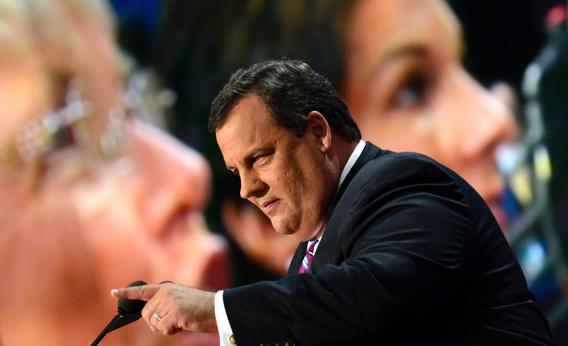Read the rest of Slate’s coverage from the GOP convention.
Ann Romney and Chris Christie delivered two different messages on the first night of the Republican Convention. Ann Romney talked about the importance of love, but Chris Christie said love wasn’t as important as respect. On the face of it, the two messages seemed in discord, but actually the messages were well-aligned, at least politically. Love Mitt Romney enough to elect him and then respect him when your love is tested because he’s making the hard choices that a president must make.
This kind of pitch works with marriages where the odds are stacked against the young couple. The groom tells his bride that their life together is going to be hard. “I don’t care,” she says. “I love you.” “We’re only going to be able to afford ramen and tap water,” he says. “I don’t care,” she says. “I love you.” He persists: “You’re going to have to walk a half an hour to the bus stop because I can’t make the car payments.” She is resolute: “I still love you.” In the end, passion and trust overcome whatever fears there are about the future.
On Tuesday night, Ann Romney and Chris Christie were marriage counselors. Ann Romney tried to vouch for the groom’s credentials. Don’t worry about this union, she said in effect, I know him better than anyone, and he’s a trustworthy guy. He’ll work hard. You’ll get home safe from whatever journey he takes you on.
Chris Christie spoke on behalf of the clear-eyed groom. Times are going to be hard, but it’ll be worth it in the end. You can believe that things will be better because the groom is being straight with you about how hard the road will be. Honesty as an aphrodisiac.
What’s a bride (or a voter) to do? If you are already in love with the handsome man from Detroit, you probably already have been texting him about meeting in the alley to elope. On the other hand, you could just be stringing him along to make your old boyfriend jealous (and confuse pollsters). If you are somewhere in the middle, you have a dilemma (or you are now the main character in one of this fall’s new romantic comedies). Which of the two counselors should you listen to?
Ann Romney made a solid case, but it was limited. If someone is undecided, you can’t just assert that she should ignore all warnings. So perhaps Ann Romney helped some people lean a little more toward this squeaky clean fella, but you could understand if they were still looking for a little more from Gov. Christie about this suitor’s prospects. But after 20 minutes of Christie talking about himself and Bruce Springsteen, I doubt Christie’s words made the choice any clearer. Indeed, some may now want to marry Christie. Others may be a little spooked. In the sales pitch, Christie talked about how hard things were going to be. The couple is going to “live, not by avoiding truths, especially the hard ones, but by facing up to them.”
Well, just how hard are things going to get? Christie won’t really say, but he does keep talking about how things are going to be hard and tough choices are going to be made. You probably want specifics—after all, this is a big decision—but Counselor Christie only repeats generalities that you have heard from so many suitors before. One thing he’s very clear about, though: hard choices.
It’s time to step off this imperfect metaphor before someone gets hurt. But the topic of hard choices deserves a closer look.
Tuesday night, Christie defined hard choices as those that are difficult because they anger voters and therefore put a politician in political peril. Christie wants points for brave decisions he made in New Jersey, and he wants Mitt Romney to get bravery points, too. But there’s a difference: Romney is seeking an advance bravery credit. Having not been elected president, he’s not actually made any hard choices. He hasn’t really talked about them either. (Though, like Christie, he promises he will.) If Romney and Christie really believed in the hard-choices formula, they’d get specific about the hard choices now, explaining to people the trade-offs they’re going to face and the government assistance they’re going to have to do without. (Think about how many bravery points they could win then.) But the hard-choice theory of politics doesn’t really call for candidates to announce hard choices. Or, to think of it another way, it’s a promise to diet in the future, which you bolster by pointing out how poorly your colleague’s diet is working.
Make no mistake, the hard choices will be hard for the people who will be affected by them, whether it’s in reduced Medicare benefits, barred access to financial aid, or bumpy roads from a drop in infrastructure spending. The pain from not addressing the budget imbalance will also have hard consequences. There is going to be change resulting from the unsustainable budget deficit. That change will come from Democratic policies, Republican policies, or no policies. Voters are looking for someone to trust in handling the belt tightening. And that takes us back to Ann Romney and her proclamation that she trusts her husband to make the inevitable hard choices that have to be made. Again, it was just her assertion. Whether you stand to gain or feel the pinch from those policies will determine whether you believe her.
